March 8, 2021
"If I just had more willpower, I'd be successful."
I have heard this numerous times in my coaching practice. I've said this before myself and I bet you have probably said this yourself.
It's a common misconception that your lack of success is due to your lack of willpower.
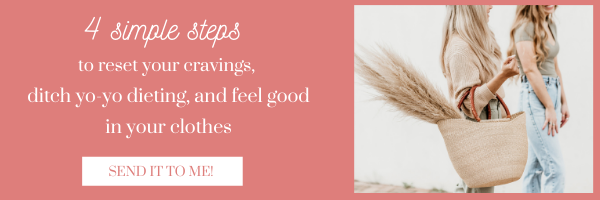
In the world of traditional "dieting" this might be true. Diets in the traditional sense rely heavily on your strength of willpower. This is due to the fact that diets rarely address nutritional needs. Cutting out carbs, for example, won't meet your nutritional needs. Your body actually needs them so it craves them -- your body is telling YOU to eat the carbs. Your diet is telling you not to eat the carbs. Enter the power struggle. Willpower matters a great deal in this situation.
Another example, would be following a 1,200 calorie diet in an effort to drop weight. (I strongly discourage this by the way. You'll be in for a huge backfire if you take this route). The problem with a 1,200 calorie diet is for most of us that number is too low. If you follow this strict caloric intake, you will be hungry. . . all. the. time! Again, following this type of a strict diet requires lots of willpower.
I know I would have an incredibly difficult time following either of these options. In both of these scenarios you're setting yourself up for failure and disappointment.
Fortunately, there are lots of ways to be successful in this arena without extremely reducing your caloric intake or cutting out all carbs.
First, make sure you are following a plan that addresses all of your nutritional needs. This is where working with a coach one on one can be a wise investment.
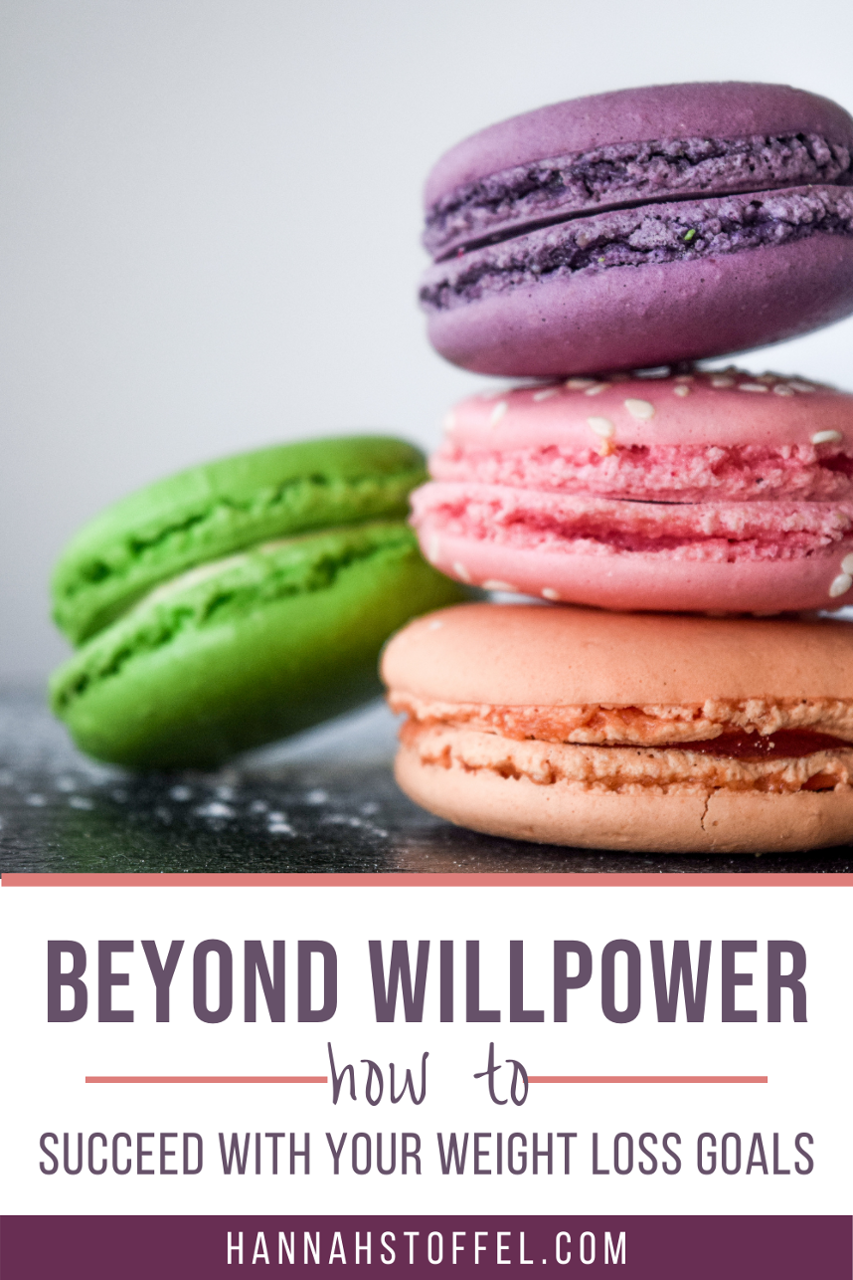
Here are 3 tips you can start implementing today to help ensure your success:
1. Access Your Physical Environment: Open up your pantry, refrigerator and freezer. Is your kitchen set up to help you reach your weight loss and health goals or is it set up for self-sabotage? Take note of foods in your home that are no longer serving your goals. Common examples might be potato chips, ice-cream, cookies, etc. It isn't that you won't ever eat these items again. However, you are much more likely to consume foods that are in your home, readily accessible.
The simple truth is you can't eat what isn't there. Rather than toss these items out, simply don't purchase them again. Instead, replace them with nourishing, life-giving foods. For the potato chips you might swap those with canned chickpeas. When you roast these with olive oil, sea salt and garlic they can really satisfy a chip craving! For the ice-cream, maybe you swap those with a fruit sweetened treat. You might also decide that you really don't have the desire for frozen treats and only ever ate the ice-cream because it was in the house. When I go through this process with my clients, many of them realize they don't miss the old food items at all.
Set your kitchen up for success. Let your kitchen work for you, rather than against you. If you have family members who show resistance to this exercise, consider giving them a designated cabinet in the kitchen. By storing those food items in a separate place, you'll be less likely to reach for them. Out of sight, out of mind.
2. Crowding Out Effect: Start by incorporating more nutrient dense foods into your diet. Your body is smart. It will continue to tell you are hungry until it gets the nutrition it needs. This is why, among other reasons, you can consume a 1500 calorie fast food meal and feel hungry again in an hour. Perhaps it's enough calories to satisfy your entire daily need, but there is very little nutritional value. By including foods rich in nutrition, vitamins, minerals and fiber, you'll naturally feel fuller for longer. Keep this simple -- think minimally processed whole grains, dark leafy greens, nuts, seeds, etc.
3. Distraction: Let's face it. Sometimes you eat out of boredom.... or procrastination....or due to stress. We all do! It's a reality of the world we live in. This is where having distractions can be beneficial. Learn to recognize your true hunger cues. Before eating, ask yourself if you are actually hungry. Consider the last time you ate. Ask yourself if you are stressed or bored or putting off a project. If you're not truly hungry, have a distraction set in place.
Here are a few you might try:
- Call a friend
- Go for a walk
- Do a load of laundry or some other household chore
- Take up a hobby that keeps your hands busy - knitting is a great option
Don't place too much emphasis on willpower. Willpower and motivation are fleeting. Creating sustainable habits and discipline is what will drive your efforts.
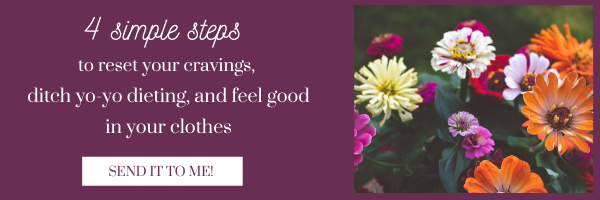
Posted in Nutrition, Wellness. Tagged as dieting, willpower.
January 19, 2018
Here come the doughnuts! There goes my diet plan!
How many times have you begun a nutrition plan or diet only to have someone bring doughnuts to your office or home?
You have the best intentions and you're certain your willpower will hold out this time. After all your beach trip is only a few, short weeks away, and you want to look good in your swimsuit!
Usually this is where the bargaining begins. You have a debate with yourself. You reason that you've been so good on your diet so you choose to indulge a little. Everyone else is, why should you be the only one left out? So you take a delicious doughnut, or two, and decide that tomorrow is a new day and you'll eat perfectly tomorrow.
Does this situation sound familiar? Maybe it's not doughnuts for you but chips and salsa, or ice cream? Whatever "it" is doesn't really matter. What does matter how you feel afterward -- as a wimp with no willpower.
I'm going to share with you a secret: willpower has nothing to do with it.
In my days of constantly chasing weight loss and experimenting with different diets this scenario was common place for me. I see the scenario daily on social media. It's usually portrayed with clever memes or a gif but, nevertheless, the guilt-trip is the same - success comes from willpower, and if you only had more of it you'd be successful.
Why does this cycle happen and how can it be stopped?
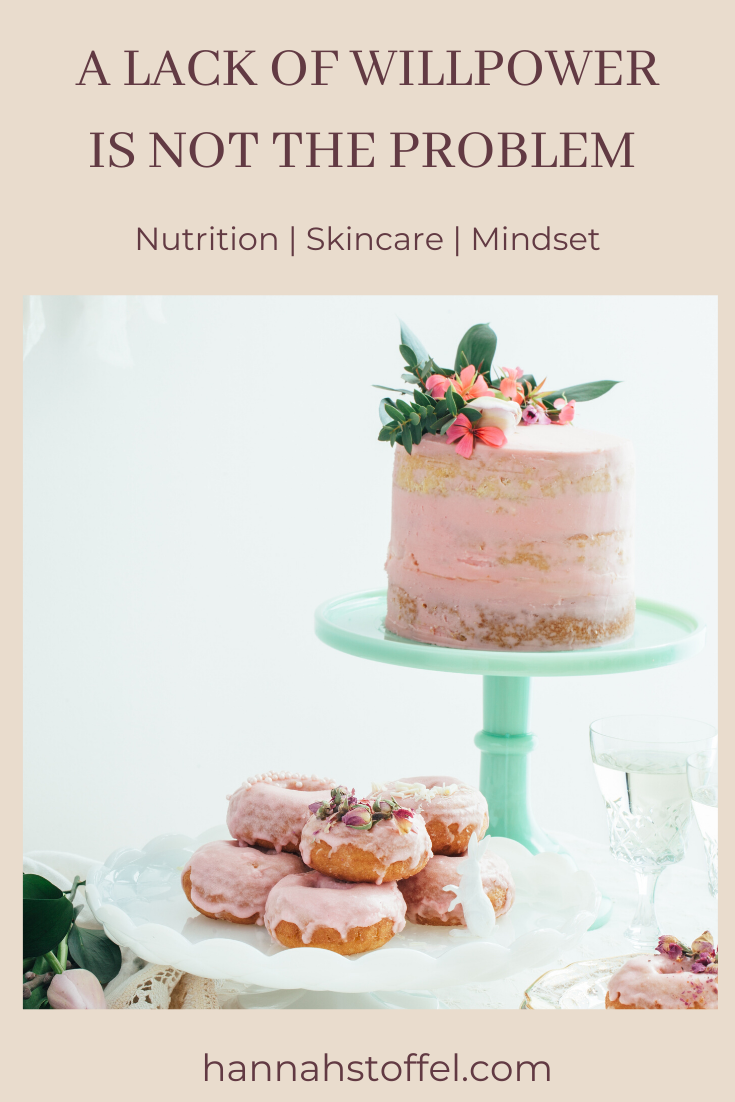 Willpower is highly overrated. It's a word we frequently use and see yet, if asked, I'm guessing most of us would have trouble defining it. It almost feels like a mystical factor that needs to be harnessed in order to have power over food.
I'll say it again. A lack of willpower is not most people's problem.
Take the focus off of willpower and instead put it on decisions, habits and discipline.
Dieting doesn't work in the long run and I'm not a fan.
Willpower is highly overrated. It's a word we frequently use and see yet, if asked, I'm guessing most of us would have trouble defining it. It almost feels like a mystical factor that needs to be harnessed in order to have power over food.
I'll say it again. A lack of willpower is not most people's problem.
Take the focus off of willpower and instead put it on decisions, habits and discipline.
Dieting doesn't work in the long run and I'm not a fan.
- It doesn't last
- it isn't a sustainable way of eating and
- it often leaves your body lacking nutritionally
Instead, of dieting for weight loss, nourish your body through whole food nutrition.
Add to that balance. Balance in life liberates us from cycles of defeat.
Take that box of doughnuts that just walked into your office. Everybody is partaking. When you do not you create at least two unproductive, self-defeating circumstances. First, you put the entire office on notice that you are "trying to lose weight." Every day after that someone (at least one) will ask how is the diet going? How much weight have you lost? Odds are the person you find most annoying will be the one who asks most often. You have put your waistline in the spotlight, center stage. That's pressure you neither want nor need.
The second self-defeating and unproductive circumstance you create when turning down a doughnut while everyone else is indulging is the "apple in the Garden of Eden" effect. The more you tell yourself "No," the stronger the attraction and urge to partake. Who wants that battle?
There's a better way, and you can embark on that way now; before the doughnuts-in-the-office challenges. Decide to change the way you eat. It is your decision. You are in control. You are the master of your destiny.
The first step is to write down why you're changing the way you eat. This can't be a simple blanket statement, such as, "I'd like to lose 10 lbs." Why do you want to lose 10 lbs? What will losing 10 lbs do for you? How will your life be different once those 10 lbs are gone? You need to answer these questions and you need to write it down.
The women I work with complete that exercise with precision and clarity. They know specifically what they want, and they know the reason behind it.
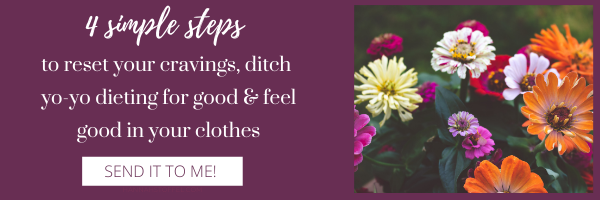 Furthermore, what you want to change has to be of greater importance than the food you want to indulge in.
When I decided to heal my acne through nutrition I learned that I needed to eliminate certain foods that were not serving my body. Unfortunately, these were foods I really didn't want to let go of. A part of me felt I needed these foods to be content. I teeter-tottered and struggled with committing to a decision for a long time, and my results showed it. My face would clear, and then I would revert to eating as I always had, and my acne would come back.
It wasn't until I became utterly dissatisfied with my appearance that I successfully eliminated certain destructive foods, and replaced those with foods that were helping my body. Now I no longer miss those old foods. But initially what kept me on track was realizing why I made the decision.
You may want to lose 5 lbs, but what that requires may not be something you want to do. The 5 lbs, you rationalize, isn't that uncomfortable to live with. Do you understand where I'm going with this? Your "why" has to be bigger than anything else. When that happen it is no longer a "should do" decision, but rather a "want to" choice. It is always easier to do what you want to do that what you should do. Granted, discipline will be necessary because motivation and drive don't always hang around long.
The final component to this is to recognize that they are physiological things, completely outside your control, that take place in the body when you change the way you eat. If you're craving something, or feel you lack self-control with certain foods (especially with highly refined carbohydrates), there is a reason. This is where one-on-one coaching will carry you to success.
Reach out to me right now. Let's have a complimentary conversation. Take the first step to becoming who you want to be.
Furthermore, what you want to change has to be of greater importance than the food you want to indulge in.
When I decided to heal my acne through nutrition I learned that I needed to eliminate certain foods that were not serving my body. Unfortunately, these were foods I really didn't want to let go of. A part of me felt I needed these foods to be content. I teeter-tottered and struggled with committing to a decision for a long time, and my results showed it. My face would clear, and then I would revert to eating as I always had, and my acne would come back.
It wasn't until I became utterly dissatisfied with my appearance that I successfully eliminated certain destructive foods, and replaced those with foods that were helping my body. Now I no longer miss those old foods. But initially what kept me on track was realizing why I made the decision.
You may want to lose 5 lbs, but what that requires may not be something you want to do. The 5 lbs, you rationalize, isn't that uncomfortable to live with. Do you understand where I'm going with this? Your "why" has to be bigger than anything else. When that happen it is no longer a "should do" decision, but rather a "want to" choice. It is always easier to do what you want to do that what you should do. Granted, discipline will be necessary because motivation and drive don't always hang around long.
The final component to this is to recognize that they are physiological things, completely outside your control, that take place in the body when you change the way you eat. If you're craving something, or feel you lack self-control with certain foods (especially with highly refined carbohydrates), there is a reason. This is where one-on-one coaching will carry you to success.
Reach out to me right now. Let's have a complimentary conversation. Take the first step to becoming who you want to be.
Hannah Stoffel
Hannah Stoffel
Posted in Nutrition. Tagged as dieting, dieting motivation, discipline, eat real food, health coach, how to lose 5 lbs, motivation, quit dieting, resist doughnuts, willpower.








